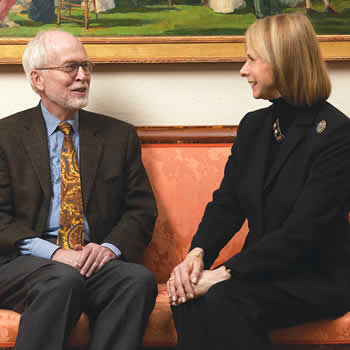The Guardian of Our Tradition of Excellence
When we consider Fran Fergusson and her presidency of Vassar, one of the most obvious comments to be made is that she is rare among contemporary college presidents in having headed a first-rank institution for two decades—two very full decades.
Her tenure at Vassar is extraordinary in that way alone. But the length of her service only begins to hint at the broader picture—in her case, that is, length of tenure in itself cannot convey the devotion, clear-headedness, and vision that have characterized her contribution. As one who worked closely with her for almost 15 of her 20 years here, I am in a position to know as well as anyone just how much energy and contemplation she has expended, how much strength of purpose, in her pursuit of a better Vassar.

She inherited a college rich in tradition and strong in academic rigor and reputation. Arguably the preeminent American women’s college, Vassar had taken the leap into coeducation in 1969 in a decision that the passage of time has proved correct without a scintilla of doubt—it was a decision that over the past 35 years has reinforced and enhanced the very standards and goals that some alumnae feared would be undermined and lost. Fran’s two predecessors, Alan Simpson and Virginia Smith, astute overseers of the enterprise, had kept Vassar on course during the period of transition to a universally accepted coeducational status. But by 1986, when Fran took up the reins, Vassar’s new direction needed firm guidance, realignment, and reaffirmation—which is exactly what she provided. The college also needed careful tending in several other areas: its physical plant, an eclectic collection of collegiate structures unsurpassed in this country in architectural interest and distinction, was showing signs of decline; so were the grounds, which cried out for a return to their 19th-century splendor. The curriculum needed a shake-up, as new methodologies and fields of study were beginning to transform the traditional ways by which the liberal arts were conveyed to students at American colleges. Strengthening the library and its collections was part of this, as were the athletics programs and the facilities needed for them to work properly. And, not least, the growing body of alumnae/i had to be incorporated more fully into the ongoing life of the college. The accomplishments of Vassar people around the country and the world needed recognition and celebration by their alma mater. The idea that Vassar was the home of its alumnae/i, and, like all homes,would be enriched in numerous ways by their ongoing support, was an idea that required fresh emphasis.
With an efficiency unrivaled among college presidents—or, I would venture, among corporate presidents—Fran briskly set out to achieve all this and more. Her myriad accomplishments have been recorded and chronicled elsewhere in this final year of her presidency, so I have no need to repeat them here. Let me just say that in the most essential of areas of college excellence—academic programs, student life, faculty enrichment, and administrative efficiency—Fran has been a transformative force.
Does this paragon have a flaw? Not really. Well,when he rpatience is running thin, she begins to twist the ring on her ring finger—it’s not a good sign, and it certainly rivets one’s attention fast. But such moments are few. In fact, her ability to listen patiently to inchoate suggestions and then to reshape them, often with a welcome degree of humor, into a more coherent plan can be quite astounding. Her ease at synthesizing a range of observations and bringing them to a focused conclusion never fails to impress.What’s more, and perhaps just as significant, Fran Fergusson is the kind of boss, the kind of friend,who comes with you to the emergency room, dropping all other plans for as long as it takes. She ushers you in and gives you a bed when you’ve lost your keys and it’s too late to call the locksmith. She finds just the right holiday gift, the gift that, in pleasing you, says something about her. She offers a sympathetic word when you didn’t realize you needed one. She thanks you even for advice she doesn’t want or agree with. In short, she discovers the ways, in the confusing, often exhausting, quotidian welter of running a college, to remain a person. In overseeing any complex operation of multiple constituencies, drive and determination, tempered with intelligence and insight, can reinforce what is already good and make innovation possible. When a leader can manifest that kind of strength and propulsive force, can put determination to effective use, can give equal attention to the intellectual and the material, can put aside personal need for a larger good, that leader would be someone like Fran Fergusson.
Professor of Classics Robert Pounder was assistant to the president for 15 years.
